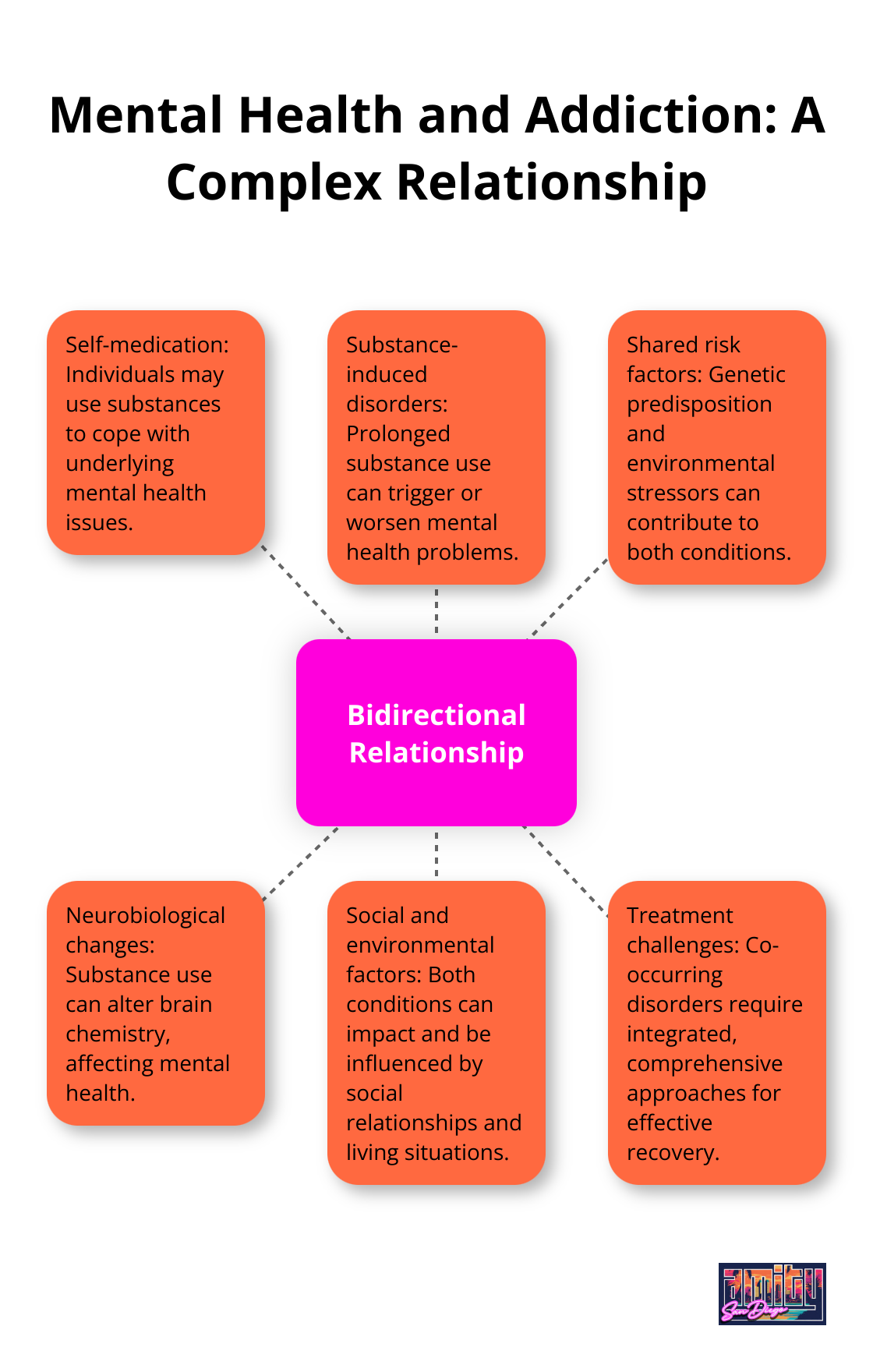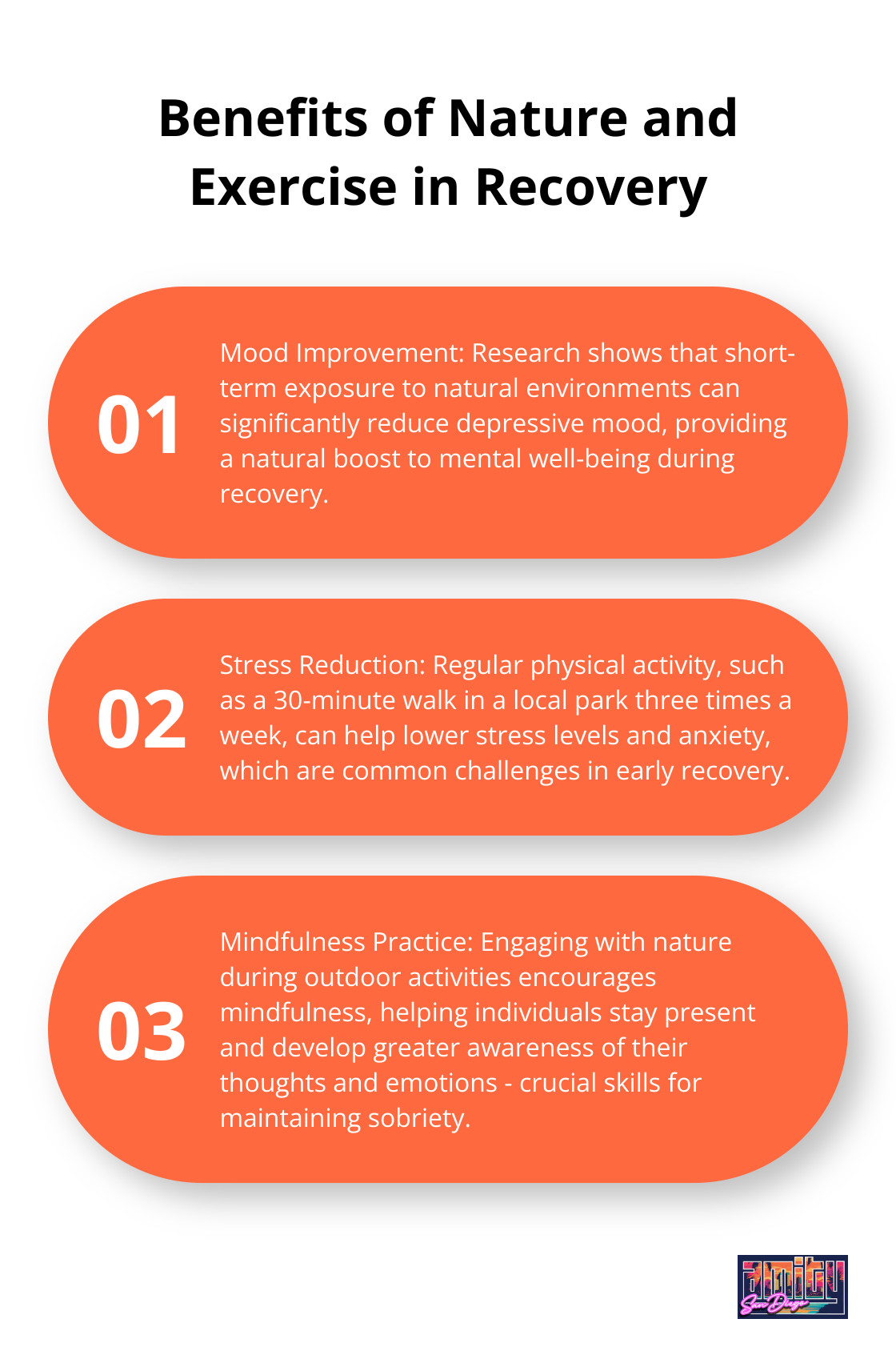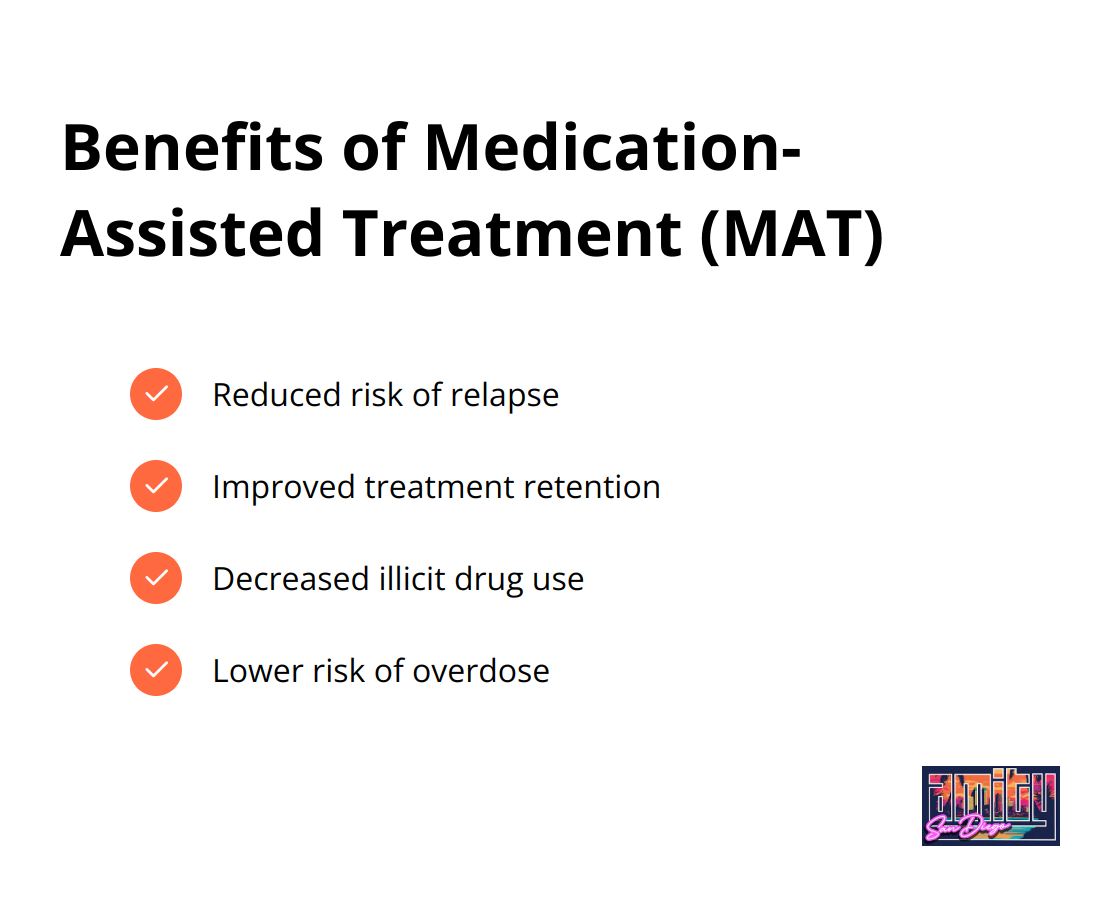Mental wellness is a cornerstone of successful addiction recovery. At Amity San Diego, we’ve seen firsthand how prioritizing mental health can significantly improve long-term sobriety outcomes.
In this post, we’ll explore effective strategies for cultivating calm and enhancing mental well-being during your recovery journey. We’ll also discuss the vital role of professional support in addressing co-occurring mental health challenges.
Mental Health and Addiction: A Two-Way Street
The Intertwined Nature of Mental Health and Substance Use
Mental health and addiction form a complex, interconnected relationship. At Amity San Diego, we recognize that addressing both simultaneously is essential for successful long-term recovery.
The Chicken or the Egg Dilemma
Many individuals use substances to self-medicate underlying mental health issues. Conversely, prolonged substance use can trigger or worsen mental health problems. This bidirectional relationship necessitates a concurrent approach to treatment.

People with substance use disorders often have co-occurring mental disorders or other health conditions such as HIV. This high rate of co-occurrence underscores the need for integrated treatment approaches.
Mental Wellness: The Foundation of Lasting Sobriety
Prioritizing mental health in recovery isn’t just beneficial – it’s essential. Here’s why:
- Improved Coping Skills: Developing healthy mechanisms for stress, anxiety, and other emotional challenges reduces the likelihood of relapse.
- Enhanced Self-Awareness: Understanding one’s thoughts, feelings, and behaviors leads to better decision-making and impulse control.
- Stronger Support Systems: Good mental health fosters healthier relationships, creating a robust support network (a key factor in maintaining sobriety).
- Increased Resilience: The ability to bounce back from setbacks is vital in the recovery journey, and mental wellness builds this resilience.
Common Mental Health Hurdles in Recovery
While everyone’s experience is unique, some mental health challenges frequently occur during recovery:
- Depression and Anxiety: These often surface as individuals adjust to life without substances.
- Post-Acute Withdrawal Syndrome (PAWS): This can cause mood swings, anxiety, and cognitive difficulties for months after quitting.
- Trauma: Many individuals with substance use disorders have experienced trauma, which may need addressing in recovery.
- Identity and Self-Esteem Issues: Rebuilding a sense of self and self-worth is a common challenge in early recovery.
- Sleep Disorders: Insomnia and other sleep disturbances are prevalent and can significantly impact mental health.
Addressing these challenges head-on, with professional support, can dramatically improve recovery outcomes. Evidence-based therapies like Cognitive Behavioral Therapy (CBT) and Eye Movement Desensitization and Reprocessing (EMDR) effectively tackle these issues.
The Path Forward: Integrating Mental Health and Addiction Treatment
The intricate connection between mental health and addiction demands a comprehensive approach to treatment. This integration ensures that individuals receive the support they need to address both aspects of their well-being simultaneously.
As we move forward, we’ll explore effective strategies for cultivating mental wellness in recovery, providing you with practical tools to support your journey towards lasting health and sobriety.
<a href=”https://share.google/V92vP2GWCF6p0tLtX”>addiction treatment San Diego</a>
Practical Tools for Mental Wellness in Recovery
At Amity San Diego, we understand the importance of mental wellness for long-term recovery. Let’s explore practical, evidence-based strategies that can help you cultivate calm and resilience on your journey to sobriety.
The Power of Mindfulness
Mindfulness is a powerful tool for managing stress and cravings. While high-quality evidence is still required to affirm the efficacy of mindfulness-based interventions (MBIs) in craving reduction, many find it helpful in their recovery journey.
You can start small: Try a 5-minute daily meditation using apps like Headspace or Calm. Focus on your breath, and when your mind wanders (it will), gently bring your attention back. With practice, you’ll develop greater awareness and control over your thoughts and emotions.
Rewiring Your Brain with CBT
Cognitive Behavioral Therapy (CBT) is a cornerstone of effective addiction treatment. It helps you identify and change negative thought patterns that can lead to substance use.
A practical CBT exercise involves keeping a thought journal for a week. Write down situations that trigger negative emotions, the automatic thoughts that follow, and how those thoughts make you feel. Then, challenge those thoughts. Are they based on facts or assumptions? Can you reframe them more positively?
Healing Through Movement and Nature
Physical activity and time in nature are powerful mood boosters. Recent research found a reduction in depressive mood following short-term exposure to natural environments.
Try this: Schedule a 30-minute walk in a local park three times a week. Pay attention to the sights, sounds, and smells around you. This simple practice combines the benefits of exercise, nature, and mindfulness.

For those who enjoy more structured activities, yoga can be particularly beneficial. A review in the Journal of Behavioral Addictions found that yoga can reduce stress, anxiety, and depression in individuals recovering from substance use disorders.
Building Your Recovery Support Network
Social support is essential for mental wellness in recovery. A study in the Journal of Substance Abuse Treatment found that individuals with strong social support were more likely to maintain long-term sobriety.
Here’s how to start building your network:
- Attend support group meetings regularly (whether in-person or online).
- Reconnect with supportive friends and family members.
- Consider volunteering – it’s a great way to meet like-minded people and boost your self-esteem.
Professional Support: A Key Component
Seeking professional help is a smart step towards lasting recovery. Many treatment centers (including Amity San Diego) offer comprehensive support for both addiction and mental health challenges. A qualified team can help you develop a personalized plan that incorporates these strategies and more.
The consistent application of these practical tools will set you on the path to cultivating lasting mental wellness and strengthening your recovery journey. In the next section, we’ll explore how professional support can further enhance your mental health and recovery efforts.
Professional Support: A Cornerstone of Successful Recovery
At Amity San Diego, we witness the transformative power of professional support in recovery outcomes. This chapter explores why expert guidance proves essential for long-term success in addiction treatment and mental wellness.
Integrated Treatment for Co-occurring Disorders
Integrated treatment addresses substance use and mental health issues simultaneously. This approach is effective in increasing the motivation for treatment amongst patients with anxiety and/or depression together with substance use disorders in outpatient settings.
The benefits of integrated treatment include:
- Higher treatment retention rates
- Decreased substance use
- Improved mental health symptoms
- Better overall functioning in daily life
Personalized Care Plans: Tailoring Treatment to Individual Needs
We develop individualized treatment plans that address each client’s unique needs. Our approach includes:
- Comprehensive initial assessment
- Evidence-based therapies (CBT, DBT, EMDR)
- Medication-assisted treatment when appropriate
- Holistic therapies (yoga, meditation, art therapy)
- Family involvement and education
This personalized approach leads to better engagement in treatment and improved long-term outcomes. Research indicates that personalized treatment plans can improve outcomes. For example, one study found that participants who received more follow-ups had significantly better alcohol use outcomes.
The Importance of Ongoing Therapy and Counseling
Recovery requires continuous support. Regular therapy sessions provide:
- Continued skill development for managing cravings and triggers
- Support for navigating life challenges without substance use
- Early intervention if relapse warning signs appear
Studies show that patients who engage in ongoing counseling for at least a year after initial treatment have significantly lower relapse rates.
To find the right ongoing support, consider these options:
- Individual therapy with a licensed addiction counselor
- Group therapy or support groups (in-person or online)
- Intensive outpatient programs for higher levels of care
- Telehealth options for flexibility and accessibility
Seeking professional support demonstrates a commitment to long-term success in recovery and mental wellness. With the right support, you can build a fulfilling life free from addiction.
The Role of Medication-Assisted Treatment (MAT)
Medication-Assisted Treatment combines behavioral therapy and medications to treat substance use disorders. MAT has proven effective for many individuals, particularly those struggling with opioid use disorder.
Benefits of MAT include:
- Reduced risk of relapse
- Improved treatment retention
- Decreased illicit drug use
- Lower risk of overdose
At Amity San Diego, we offer MAT as part of our comprehensive treatment approach (when appropriate). Our medical professionals work closely with each client to determine if MAT is a suitable option for their recovery journey.

Final Thoughts
Mental wellness forms a cornerstone of successful addiction recovery. We at Amity San Diego integrate evidence-based therapies and personalized care plans to address the complex needs of individuals struggling with addiction and co-occurring mental health disorders. Our comprehensive approach supports lasting sobriety and overall well-being.
Professional support plays a vital role in achieving long-term recovery success. We encourage you to prioritize your mental wellness as an integral part of your journey to sobriety. Seeking help demonstrates strength and commitment to your health and future.
Take the first step towards comprehensive healing today. Your decision to focus on both mental health and addiction recovery will give you the best chance at a fulfilling, substance-free life. Contact Amity San Diego to learn more about our tailored treatment options and start your path to lasting wellness.

